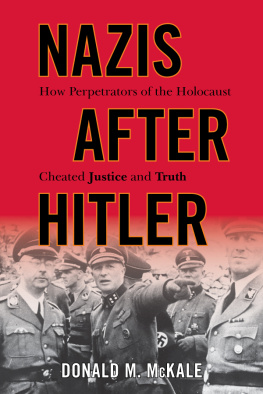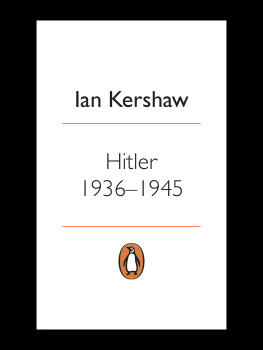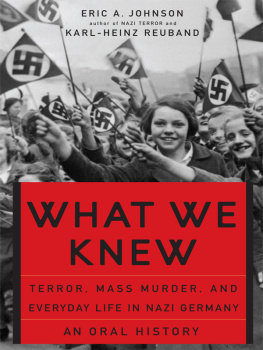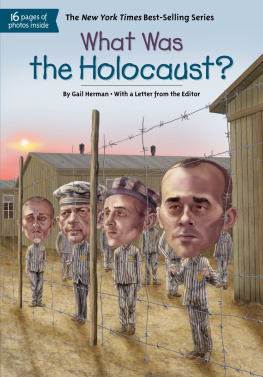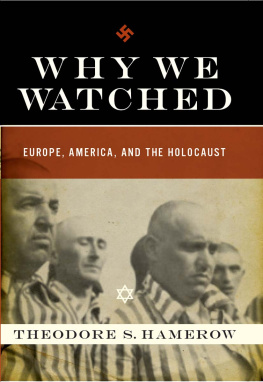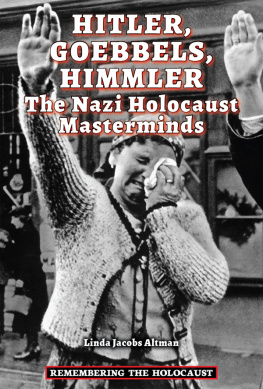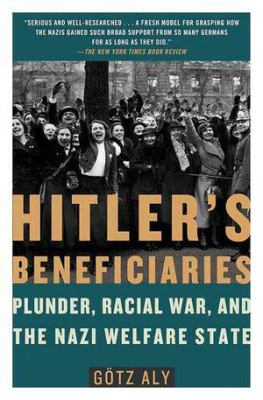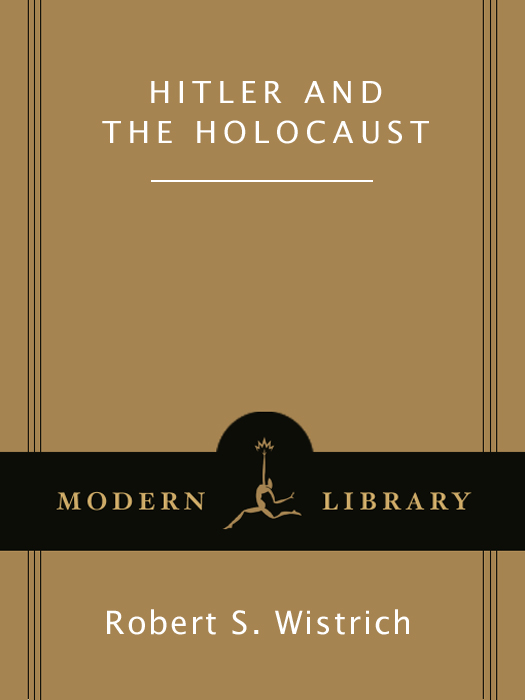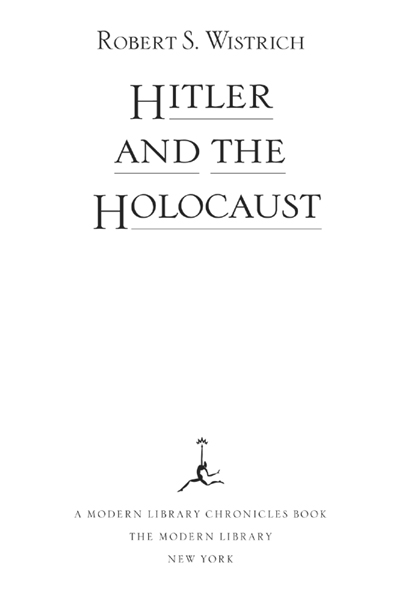M ODERN L IBRARY C HRONICLES
C HINUA A CHEBE on Africa
K AREN A RMSTRONG on Islam
D AVID B ERLINSKI on mathematics
R ICHARD B ESSEL on Nazi Germany
I AN B URUMA on the rise of modern Japan
J AMES D AVIDSON on the Golden Age of Athens
S EAMUS D EANE on the Irish
F ELIPE F ERNNDEZ -A RMESTO on the Americas
L AWRENCE F RIEDMAN on law in America
P AUL F USSELL on World War II in Europe
P AUL J OHNSON on the Renaissance
T ONY J UDT on the Cold War
F RANK K ERMODE on the age of Shakespeare
J OEL K OTKIN on the city
H ANS K NG on the Catholic Church
B ERNARD L EWIS on the Holy Land
M ARK M AZOWER on the Balkans
J OHN M ICKLETHWAIT and A DRIAN W OOLDRIDGE on the company
P ANKAJ M ISHRA on the rise of modern India
A NTHONY P AGDEN on peoples and empires
R ICHARD P IPES on Communism
C OLIN R ENFREW on prehistory
J OHN R USSELL on the museum
K EVIN S TARR on California
C ATHARINE S TIMPSON on the university
M ICHAEL S TRMER on the German Empire, 18701918
S TEVEN W EINBERG on science
B ERNARD W ILLIAMS on freedom
A. N. W ILSON on London
G ORDON S. W OOD on the American Revolution
J AMES W OOD on the history of the novel
2001 Modern Library Edition
Copyright 2001 by Robert S. Wistrich
All rights reserved under International and Pan-American
Copyright Conventions. Published in the United States by
Modern Library, a division of Random House, Inc., New York,
and simultaneously in Canada by Random House of
Canada Limited, Toronto.
M ODERN L IBRARY and colophon are registered trademarks
of Random House, Inc.
Published by arrangement with Weidenfeld & Nicolson,
a division of Orion Publishing Group Ltd.
LIBRARY OF CONGRESS CATALOGING-IN-PUBLICATION DATA
Wistrich, Robert S.
Hitler and the Holocaust / Robert Wistrich.
p. cm.(Modern Library chronicles)
eISBN: 978-1-58836-097-7
1. Holocaust, Jewish (1939-1945) I. Title. II. Series.
D804.3.W469 2001
940.5318dc21
2001030835
Modern Library website address: www.modernlibrary.com
v3.1
To my mother, Sabina,
who lived through it all without losing faith
ACKNOWLEDGMENTS
The research for this book was conducted over a number of years in many archives, libraries, and research institutes in Israel, Europe, Britain, and America. My indebtedness to the work of countless scholars, too numerous to mention here, will be apparent from the endnotes. As one of the six historians appointed to the Vatican Historical Commission to study the role of Pius XII during the Holocaust, I also benefited from access to many sources in at least seven languages that proved helpful in the writing of this book. During the first six months of 2000, I was fortunate enough to be a visiting professor at the Netherlands Institute for Advanced Studies in Wassenaar. I wish to thank Professor Wesseling and his gracious staff for their hospitality and assistance. This project was originally proposed to me by Toby Mundy and supervised by Rebecca Wilson of Weidenfeld & Nicolson, whose suggestions were most useful. I gratefully acknowledge the efforts of Frances Bruce in deciphering my handwritten text and putting it into a readable format. I owe a special debt to Trudy Gold, Director of Holocaust Education at the London Jewish Cultural Institute, for help and encouragement at critical moments. I also learned much from my earlier work with the Institute in writing the text for the educational packet Lessons of the Holocaust (1997), now used widely in British schools; and in collaborating with Rex Bloomstein in making the film Understanding the Holocaust, for which I also wrote the script. As always, I owe a debt of gratitude to my wife, Daniella, and my three children for their patient understanding of my single-minded dedication to this project. This book is dedicated to my mother, Sabina, born in Cracow ninety years ago, who always set me an example of how one can overcome adversity with fortitude and spirit.
Robert Solomon Wistrich
London/Jerusalem
December 2000
CONTENTS
INTRODUCTION
The missionaries of Christianity had said in effect: You have no right to live among us as Jews. The secular rulers who followed had proclaimed: You have no right to live among us. The German Nazis had at last decreed: You have no right to live.
RAUL HILBERG, The Destruction of the European Jews (1961)
The Holocaust was an unprecedented crime against humanity that aimed at the annihilation of the entire Jewish population of Europe, down to the last man, woman, and child. It was the planned, deliberate policy decision of a powerful state, the Nazi Reich, which mobilized all of its resources to destroy an entire people. The Jews were not condemned to die for their religious beliefs or for their political opinions. Nor were they an economic or military threat to the Nazi state. They were killed not for what they had done but for the simple fact of their existence.
To be born a Jew, in the eyes of Adolf Hitler and the Nazi regime, meant that one was a priori not a human being and therefore unworthy of life. There were other innocent victims of Nazi racial ideology: Gypsies, who were considered racially impure, were sent to the gas chambers; Russians, Poles, and other occupied peoples in eastern Europe were reduced to slavery; even those ethnic Germans who were branded as mentally or physically defective were put to death until a public outcry moderated this policy. We know that under the Nazi regime, the SS, the Einsatzgruppen (mobile killing units), the Wehrmacht, the Order Police, and the guards in the death camps practiced brutality on a hitherto unknown scale; that they mowed down row upon row of shivering, half-naked adults and smashed the heads of Jewish infants without pity or remorse; that they built a vast system of concentration camps and death camps, the purpose of which was the production of corpses on an industrial scale.
The central unanswered question is why? Why were Jews worked to death on senseless, unproductive tasks, even when the Reich was experiencing an acute labor shortage? Why were skilled Jewish armament workers killed in the camps despite the pressing military needs of the Wehrmacht? Why did the Nazis insist they were fighting an omnipotent Jewish power even as their mass murder of the Jews revealed the powerlessness of their enemy?
At the heart of this seeming mystery lay a millenarian weltanschauung (worldview) which proclaimed that the Jews were the source of all evilsespecially internationalism, pacifism, democracy, and Marxism; that they were responsible for Christianity, the Enlightenment, and Freemasonry. They were branded a ferment of decomposition, formlessness, chaos, and racial degeneration. The Jews were identified with the fragmentation of urban civilization, the dissolving acid of critical rationalism, and the loosening of morality. They stood behind the rootless cosmopolitanism of international capital and the threat of world revolution. In a word, they were the Weltfeindthe world enemy against which National Socialism defined its own grandiose racial utopia of a Thousand-year Reich.
In Hitlers genocidal, racist ideology, the redemption (Erlsung) of the Germans and of Aryan humanity depended upon the Final Solution (


